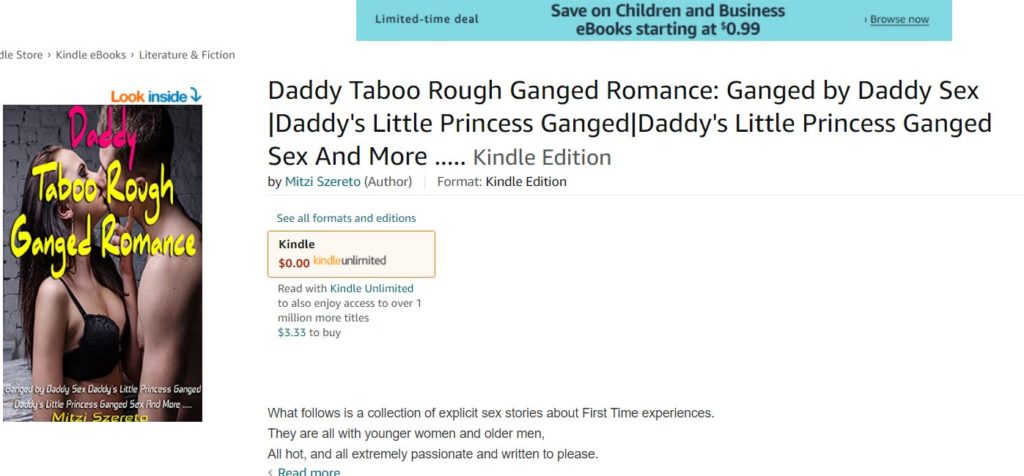UPDATE: Since this blog was first published, there were more Kindle e-books showing up fraudulently using my name. In fact, the fraud spread to include other authors, some of whom have been dead for decades. The issue, as of now, has finally been resolved.
It often seems as if anyone with a pulse is claiming to be an author these days thanks to DIY self-publishing platforms such as Amazon KDP. It’s all well and good to level the playing field a bit, but what happens when some of these individuals with a pulse have sinister and criminal motives? The self-publishing field is out of control and no one is minding the shop. Anyone can sign up to a platform and “publish” a book, even if the contents of said book have been stolen from another author, or if another author’s name has been stolen to use on the book listing and on the cover. Every time we turn around, there’s a new scam. It’s not bad enough that authors have to deal with book piracy and copyright infringement; now we have to deal with lowlifes stealing our names in order to sell bogus books.
And that’s exactly what happened to me. It recently came to my notice that I’d apparently penned two cheap and tacky “erotica” books that were published on Kindle. No sooner did I succeed in having them taken down than two more appeared (it will probably be more by the time you read this). The odd thing is, I did not write these books. In fact, I had nothing to do with their entry into the wide world of publishing. Yet there I was, listed as author, even down to my name on the equally cheap and tacky book jackets (which were probably also stolen).
Clearly, I was most displeased. I immediately got on to Amazon, filing complaints and reporting the books. I also blasted all over social media that I did not write these books, and encouraged my readers and followers to do likewise by reporting the books and posting reviews stating that I had publicly declared that these books were uploaded by fraudsters looking to illegally trade on my name.
This is brand infringement, fraud, identity theft, and lastly, a violation of right of publicity. Not familiar with the latter? Well, let me enlighten you. As defined by the International Trademark Association: “The right of publicity is an intellectual property right that protects against the misappropriation of a person’s name, likeness, or other indicia of personal identity—such as nickname, pseudonym, voice, signature, likeness, or photograph—for commercial benefit.”
If my name was Mary Smith, sure—maybe we can chalk this up to a disturbing and unpleasant coincidence. But my name is not Mary Smith, and I’m not a big believer in coincidences, especially coincidences such as this. No, the individual (or individuals) behind this scam knows exactly what he/she/they is doing and has likely done it before—and will likely do it again, perhaps setting up shop with a new self-publishing account.
What’s amusing, if there is anything remotely amusing about this, is that I haven’t produced any books in the erotic field in years. And when I did produce them, they looked nothing like this trash being illegally attributed to me. In fact, my work in recent years has been in the area of true crime with my series The Best New True Crime Stories, and there are plenty of juicy murders in the mix. So using my name to sell some shoddy smut books is bizarre, especially books that anyone with half a brain can plainly see are not something I’d write. Either someone is targeting me personally or my name simply got pulled out of a hat by a fraudster hoping to make a few bucks or quid off it.
If you can believe it, one of these books was more than 650 pages long too. That’s a substantial tome, indeed. If you wrote something that ambitious, wouldn’t you want to have your name in big letters on the cover? Which begs the question—just where did all this content even come from? It doesn’t sound too farfetched to conclude that in addition to this culprit stealing my name (and therefore my brand), he/she/they likely stole the text too, and stole it from multiple writers. The fact that books keep appearing with such frequency—within hours, in fact—is clear indication that the fraudster has stockpiled a slew of stolen material, and is ready and willing to upload it to a self-publishing platform regardless of how many laws are broken.
To self publish on Amazon, you must provide your legal name and address, a US social security or tax ID number, and your bank details. It is by no means an anonymous process, especially when it involves the Internal Revenue Service. Your identity is there and available to Amazon. Having said that, you can still stick any name on the line that asks for book “author.” This is what has been done. And if it was done to me, it’s a safe bet that it’s being done to other authors in an attempt to hitchhike off our hardworking backs to make a fast and illegal buck.
There have been a number of scams and schemes put into play by so-called self-published “authors” over the years. This article in The Guardian outlines just a few. (Thankfully, most self-published writers seem to want to write rather than steal, and a few have even done well in their self-publishing endeavours.) So what’s to stop this from happening again to me or to another author? Is Amazon putting more security checks in place to make sure that people who self-publish are using names they are legally entitled to use, even if it’s just a pen name? The self-publishing system is too open to abuse. Amazon is not protecting the authors from whom it derives so much income. With each hour that these bogus books remain on their site (and they appear on sites internationally), Amazon is enabling criminals to continue their illegal activity and abuse.
With Amazon’s vast resources, surely something can be done, especially when Joe Blow the Scammer is suddenly publishing books by a name-known author. It’s pretty ballsy to steal an established author’s name and stick it on some books with content that came from who knows where, and paste together a book cover. I’ve heard of cases of self-published writers stealing content from other self-published writers (this appears to be more prevalent in erotica and romance than in other genres), but stealing a known author’s name isn’t particularly bright. The scammer’s private information is stored at Amazon. They know who you are. At the very least, Amazon and other DIY publishing entities should red-flag these individuals’ social security and tax ID numbers to make sure they can’t keep coming back like a bad smell and open another self-publishing account. Involving law enforcement is a wise idea too, be it by Amazon (who also has a vast legal team at their disposal) and/or by the author who has been a victim of said scam. Requesting from Amazon the violator’s name and address so a police report for fraud and identity theft can be filed in the culprit’s local jurisdiction can’t hurt. Because yes, this is fraud and identity theft, even if it isn’t from using a fake credit card or filing a fake tax return or filing a fake unemployment claim. This is criminal activity and it needs to be treated as such. At the very least, filing a police report could prompt a visit by the local police to the home of said scammers. That would be one knock on the door they weren’t likely expecting. I myself am already speaking to law enforcement about this and will be taking any measures possible to put a stop to it. The fact that in the USA this reaches across state lines already makes it a federal matter, and it actually goes a lot wider into the international level. This is more than misappropriating an author’s name—it’s fraud and identity theft, which are very serious crimes.
Authors, especially those with multiple books published, should regularly check their names on bookselling sites that offer a self-publishing platform. If something looks suspicious, and it’s usually obvious when something’s dodgy, then report it. Because I guarantee, if this happened to me, it can happen to you (if it hasn’t already!).





[…] This is an important topic for writers, publishers, AND readers because you don’t want to buy a piece of rubbish you believe written by your favourite author and mark them down for substandard work, when the work isn’t theirs. My advice, though I hate to complicate already busy lives, is to check author websites, if in doubt contact the author, as now one cannot take a listing even on Amazon as assurance of a legal and genuine product. You don’t want to hand over your hard-earned money to a criminal. It’s also identity theft and a serious crime. Yes, you heard right. There’s plagiarism and then there’s THIS. […]